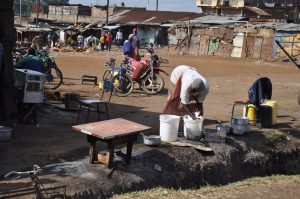Nairobi, Kenya — Lack of clean water and sanitation plagues Nairobi slums.
ø
Nairobi, Kenya — In both the Kiberia and Mathare slums of Nairobi, life is hard and perilous. The procurement and storage of clean water are consuming facets of daily life; and the sanitation infrastructure inadequate to prevent disease. Containers for storing clean water are coveted.
With both slums built in a basin, sanitation may consist only of the downhill flow of waste–at times near, or through, food preparation areas–into streams that ultimately feed the heavily contaminated Nairobi river.

During the rainy season, standing water provides breeding areas for disease-carrying mosquitoes and other insect vectors. Health care is functionally nonexistent except for that provided by the charities and NGOs.
Dung burning stoves are common and the quest for fuel, food, and clean water consumes a significant portion of daily life and meager incomes. Children are often tasked to help procure and help carry heavy water containers.
The water used in washing clothes and utensils is rarely potable and often drawn from a common trench. After use, wash water is frequently dumped back into the same trench.
Read full text here
Photo: Lack of clean water and sanitation plagues Nairobi slums. Nairobi, Kenya. 2012 (c) K. Lee Lerner / LMG. All commercial rights reserved.


